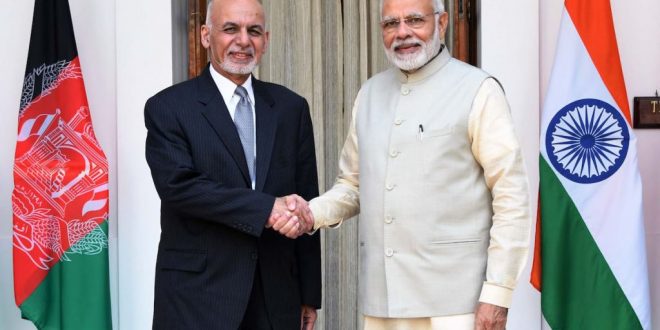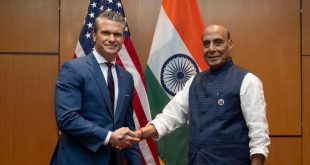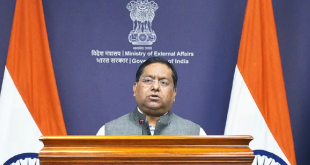In today’s India-friendly Afghanistan, the Taliban are a reality. Any meaningful peace process will need the direct participation of New Delhi.
Afghanistan’s foreign minister, Mohammed Haneef Atmar, was in New Delhi on a three-day official visit to discuss the ‘Afghan peace process’ with Indian officials. The trip comes as the US has mobilised regional actors to support its plan to establish a power-sharing government in Kabul.
Last week, the special representatives of Russia, US, China, Pakistan, Qatar and Turkey met in Moscow to boost the US-led peace process for a negotiated settlement with the Taliban and pave the way for the upcoming Turkey conference on Afghanistan. Focusing on a quick political settlement, the April conference in Turkey will ‘finalise’ a peace agreement.
As Afghanistan is entering a new chapter of the Great Game, what is India’s role in this prevailing geopolitical struggle? How active is New Delhi in shaping regional affairs? It is imperative for India to rethink its regional policy and join Russia, China and Iran in bringing peace and stability to Afghanistan. New Delhi should be fully on board and take an active role by working closely with the Afghan leaders and the US for the establishment of a broad-based and inclusive government, one that does not come at the cost of the progress hitherto made in Afghanistan.
Reality on the ground
Recent developments once again show that Pakistan is key to the implementation of Washington’s new strategy on Afghanistan. As an influential neighbour, it can both cause war and suffering to the Afghan people, and assist peace efforts. The US-Taliban agreement signed last year is, at the outset, a deal between Washington and Islamabad. Pakistan is temporarily gaining the geopolitical advantage it has always sought in the region. It is now pushing to align all major players in this power game to support the US peace plan for Afghanistan.
Iran’s foreign minister Mohammad Javad Zarif, in a meeting with Pakistan’s special envoy for Afghanistan Mohammad Sadiq Khan, has said the “establishment” of peace in Afghanistan is “an important priority”. The two countries also held a number of meetings in which Afghanistan was on the agenda in October last year. It is said that Pakistan’s special envoy’s call on Iranian officials, ahead of the Moscow conference, was aimed at securing Tehran’s agreement on a power-sharing government in Afghanistan. After the meeting, quoting unnamed officials, a Reuters report, said that both Russia and Iran have agreed on the creation of “an interim government” in Kabul. Earlier this month, senior Pakistani military and intelligence officials met their Afghan counterparts in Bahrain with the UK’s Chief of Defence Staff Gen. Nicholas Carter to discuss the ongoing peace efforts with the Taliban.
Washington is seemingly withdrawing its troops from Afghanistan soon. US Secretary of State Antony J. Blinken recently dictated Afghan President Ashraf Ghani “to positively consider” and support the US roadmap to “a new, inclusive government” with the Taliban. It represented a clear abuse of our national sovereignty. Blinken’s letter proved that for Washington, Afghanistan’s national sovereignty is nothing more than a false idea and an illusion. It reminded me of Zbigniew Brzezinski, who once said that “national sovereignty was increasingly an illusion for all but a few very powerful states” (The Choice by Zbigniew Brzezinski).
This harsh reality should bring Afghanistan’s regional friends and allies together to cooperate rather than compete with each other. The absence of sincere cooperation among regional players for durable peace and stability in Afghanistan (our region) is the underlying cause for the continuing geopolitical chaos in South Asia.
US will leave, time for India to step in
Here and now, it is likely that the Biden administration will respect the 1 May departure deadline. Blinken’s letter clearly warns that in the case of an American military withdrawal, in the absence of a political settlement, Afghanistan’s security situation will “worsen and the Taliban could make rapid territorial gains”. This will be an alarming crisis not only for Afghanistan but for the whole region.
From the Afghan perspective, there is no guarantee that Pakistan will not push through the weak points of the power game on Afghanistan. If Afghan provinces fell to the Taliban and war intensified, Pakistan’s military would have the upper hand and the Inter-Services Intelligence (ISI) would exploit the prevailing chaos. It will take Afghanistan further into war, instability and subsequently, the restoration of the Taliban’s Emirate. These are deceitful scenarios for Afghanistan and the region, in which India is a key player. Under tremendous pressure both from the United States and within the country, Ashraf Ghani has proposed a “new presidential election within six months” and rejected the US’ plan to replace his increasingly unpopular government. It is seemingly aimed to reduce pressures and divert the general attention away from his administration. This is very unrealistic and fictitious both practically and financially. It will have no support from the international community and the Afghan people. Afghans want to see the republic safeguarded, however, they do not see Ashraf Ghani and his disliked government as the republic. Therefore, supporting peace negotiations with the Taliban is the right step in the right direction. The US new plan may not be the best choice, but it offers the foremost opportunity for peace and stability in Afghanistan.
Historically, India has been involved in peacemaking in Afghanistan. In the 1980s, under the tenure of Rajiv Gandhi, India undertook a series of efforts to “restore peace in Afghanistan” (The Great Game in Afghanistan by Kallol Bhattacherjee). Now, in Turkey next month, New Delhi should demonstrate that it is on board and fully supports peace and a political settlement in Afghanistan. The Afghan people have benefited a lot from India’s assistance in the past two decades. India has a commitment to Afghanistan and therewith, expanding its engagement with the Afghan people is highly desirable.
In the 1980s and ’90s, in order to contain Pakistan’s influence on Afghan affairs, India supported some Afghan groups. In today’s Afghanistan, from east to west and from south to north, Afghans see India as their friend and ally. Any Indian policy for Afghanistan should be focused on the entire Afghan polity, not particular groups. In today’s India-friendly Afghanistan, the Taliban are a reality. They are getting support and attention from different quarters and they are showing their willingness to be part of the wider world. Therefore, it is time for India to openly engage with the Taliban leaders.
 Afghanistan Times Latest News and Analysis from Afghanistan and the Region
Afghanistan Times Latest News and Analysis from Afghanistan and the Region




